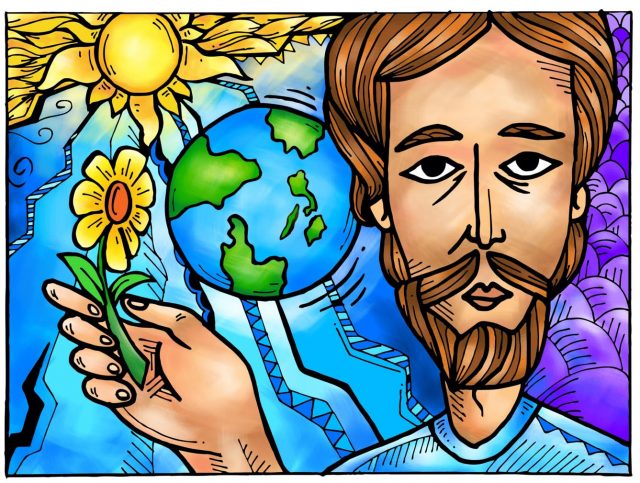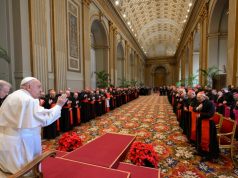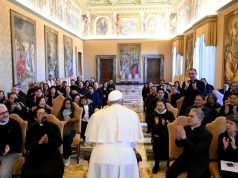The author belongs to the Order of Augustinian Recollects and is an artist and staunch advocate for the environment. In March last year, he received in Manila the first “Green Ring” award from former US vice president and Nobel laureate Al Gore, founder of the Climate Reality Project, with which he is also involved.
Laudato Si’: On Care for Our Common Home, is the encyclical letter Pope Francis completed on May 24, 2015 and officially released on June 18, 2015.
The word “care” spells out the embracing message of Pope Francis on Mother Earth.
Care for the poor, care for the planet, care for nature, care for the communities, care for people — care for God’s creation. Pope Francis speaks all about “caring for our common home” in Laudato Si’.
Caring for the Earth is inseparable from social justice.
“We need to strengthen the conviction that we are one single human family. There are no frontiers or barriers, political or social, behind which we can hide, still less is there room for the globalization of indifference.” (Laudato Si’ #53)
“Undeniably, the poor are the victims “we have to realize that a true ecological approach always becomes a social approach; it must integrate questions of justice in debates on the environment, so as to hear both the cry of the earth and the cry of the poor.” (Laudato Si’ #53)
“Caring for the Earth is living Integral Ecology, ecology is not just entirely ‘environmental,’ it is beyond environmental, rather it is the quality of life in all elements of ecology: environmental, economic, social, cultural, behavioral, and ‘structural.” (Laudato Si’ #137)
“Strategies for a solution demand an integrated approach to combating poverty, restoring dignity to the excluded, and at the same time protecting nature.” (Laudato Si’ #139)
Caring for the Earth is praxis-oriented. How? We can try the green actions proposed by Pope Francis (Laudato Si’ #211):
- avoiding the use of plastic and paper
- reducing water consumption
- separating refuse
- cooking only what can reasonably be consumed
- showing care for other living beings
- using public transport or car-pooling
- planting trees
- turning off unnecessary lights
- reusing something instead of immediately discarding it
(All of these reflect a generous and worthy creativity which brings out the best in human beings… when done for the right reasons, can be an act of love which expresses our own dignity.)”
Caring for the Earth is ending environmental or climate change (Laudato Si’ #24), “which are already being dramatically felt in many countries, especially the insular states of the Pacific, remind us of the gravity of neglect and inaction. The time to find global solutions is running out. We can find appropriate solutions only if we act together and in agreement. There is therefore a clear, definitive and urgent ethical imperative to act.” (Message of Pope Francis to the President of COP 20 under the United Nations Framework Convention on Climate Change – UNFCCC)
Caring for the Earth is breaking free from fossil fuels “the use of highly polluting fossil fuels — especially coal, but also oil and, to a lesser degree, gas — needs to be progressively replaced without delay…” (Laudato Si’ #165)
“There is an urgent need to develop policies so that, in the next few years, the emission of carbon dioxide and other highly polluting gases can be drastically reduced, for example, substituting for fossil fuels and developing sources of renewable energy,” (Laudato Si’ #26) starting with our homes, our communities to our institutions.
Caring for the Earth is a call for us to collectively divest, re-channeling our resources for the common good, contributing to a pro-people and pro-environment investment sp that our resources can cripple the profit-driven powers of business and individuals.
“An effective fight against global warming will be possible only through a responsible collective action, which overcomes particular interests and behaviors and develops unfettered by political and economic pressures. A collective response which is also capable of overcoming mistrust and of fostering a culture of solidarity, of encounter and of dialogue; capable of demonstrating responsibility to protect the planet and the human family.” (Message of Pope Francis to the President of COP 20 under the United Nations Framework Convention on Climate Change – UNFCCC)
Caring for the Earth is caring for biodiversity. “The natural environment is a collective good, the patrimony of all humanity and the responsibility of everyone.” (Laudato Si’ #95) The reality of ecological degradation of our forests, our oceans and even of the air quality affect all of us creatures — plants, animals, humans and every living being. We want our “common home” to be livable not only of today but also for the future, not only for humans but also for other creatures.
Caring for the Earth is embracing the interconnectedness of everything. (Laudato Si#16)
“Our relationship with the environment can never be isolated from our relationship with others and with God.” (Laudato Si’ #119)
“Because all creatures are connected, each must be cherished with love and respect for all of us as living creatures are dependent on one another.” (Laudato Si’ #42)
We are made to believe that we can use the earth’s resources for the good of humanity and the economy; not mentioning the sustaining importance of the cycle of life, giving to the interconnectedness of everything.
Caring for the Earth is caring for the poor and vulnerable, “the human environment and the natural environment deteriorate together; we cannot adequately combat environmental degradation unless we attend to causes related to human and social degradation. In fact, the deterioration of the environment and of society affects the most vulnerable people on the planet: ‘Both everyday experience and scientific research show that the gravest effects of all attacks on the environment are suffered by the poorest’.” (Laudato Si’ #48) Utmost care for the migrants and refugees, for the indigenous communities, and for all those affected by tragedies and disasters is of paramount importance.
Caring for the Earth sustains and strengthens our ecological faith, in the lights and shadows of our climate action “may our struggles and our concern for this planet never take away the joy of our hope.” “God, who calls us to generous commitment and to give him our all, offers us the light and the strength needed to continue on our way. In the heart of this world, the Lord of life, who loves us so much, is always present. He does not abandon us, he does not leave us alone, for he has united himself definitively to our earth, and his love constantly impels us to find new ways forward.” (Laudato Si #245)
Caring for the Earth leads us to contemplation, “all creatures are moving forward with us and through us towards a common point of arrival, which is God, in that transcendent fullness where the risen Christ embraces and illumines all things. Human beings, endowed with intelligence and love, and drawn by the fullness of Christ, are called to lead all creatures back to their Creator.” (Laudato Si #83)
Caring for the Earth is caring God’s creation — which is nature, our common home. “Blessed are those who protect and care for our common home.” (New Beatitudes of Pope Francis)










